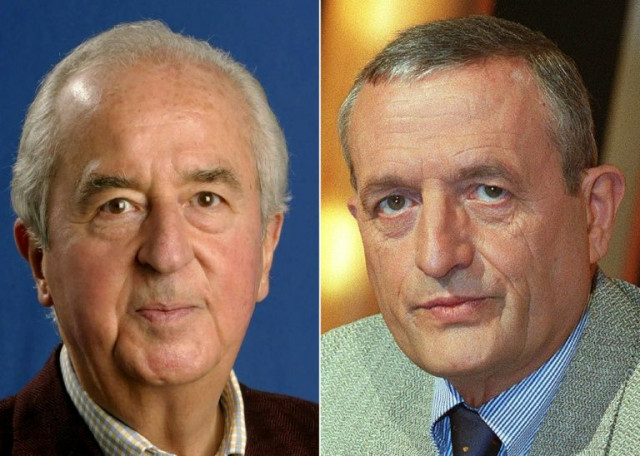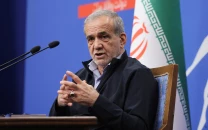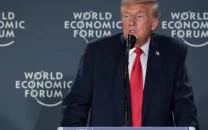French court orders jail terms for accused involved in 'Karachi affair' kickbacks
Paying bribes on arms deals was common practice when Balladur's govt won contracts to sell submarines to Pakistan

Former French prime minister Edouard Balladur, left, and his defence minister Francois Leotard also face charges on suspicions of profiting from kickbacks on 1994 arms deals with Pakistan and Saudi Arabia. PHOTO: AFP
The court handed the men prison sentences of two to five years over the so-called "Karachi affair" which has dogged former prime minister Edouard Balladur, facing trial separately on charges he used the kickbacks to help fund his failed 1995 presidential bid.
They were the first convictions to emerge after more than a quarter-century of investigations named after the Pakistani city where a bus carrying French defence engineers was blown up in 2002, killing 15 people.
The al-Qaeda was initially suspected of the attack, but the focus later shifted to the arms deals on suspicions the bombing may have been in retaliation for non-payment of promised bribes.
The three former aides are Nicolas Bazire, Balladur's former campaign manager; Renaud Donnedieu de Vabres, a former advisor to his defence minister Francois Leotard; and Thierry Gaubert, a former aide to then budget minister Nicolas Sarkozy who became president in 2007.
Bazire and Donnedieu de Vabres were sentenced to three years in prison, with the court saying Bazire "knew perfectly well" that as much as 10 million francs (some 1.5 million euros) from dubious sources had landed in Balladur's campaign accounts.
Gaubert was handed a two-year sentence, as was Dominique Castellan, a former head of the international division of French naval defence contractor DCN (since renamed Naval Group).
Two Lebanese middlemen who acted as go-betweens for the bribes and kickbacks, Ziad Takieddine and Abdul Rahman El-Assir, were sentenced to five years in prison.
The two were not present for Monday's ruling, and warrants were issued for their arrest.
The other four said they would appeal the ruling, and remain free men until then. Takieddine's lawyer said he, too, would appeal.
Exceptionally grave
Paying bribes on arms deals was common practice when Balladur's government won contracts to sell submarines to Pakistan and frigates to Saudi Arabia in 1994.
Earning kickbacks on the deals, however, was banned.
Investigators suspect the French of having paid some 300 million euros (almost $340 million) in bribes to facilitate deals worth over seven billion euros, triggering several tens of millions of euros in kickbacks.
Denouncing a "veritable prediatory enterprise", prosecutors had sought prison sentences of up to seven years for the six on charges of abuse of public goods.
The court said Monday some of the officials clearly knew of the "exorbitant commissions" paid in the deals, which constituted "an exceptionally grave threat to the public economic order, and to the confidence in the functioning of public affairs."
Balladur, 91, and Leotard, 78, have also been charged in the case.
They are to be tried in the coming months by the Court of Justice of the Republic, a tribunal that hears cases of alleged misconduct by government ministers.
Balladur lost the 1995 presidential contest to Jacques Chirac, who ended the payment of all remaining commissions on the arms deals.
That prompted speculation that the 2002 Karachi bombing was revenge for the lost payouts, but the theory was dismissed by France's DGSI counter-terrorism agency last year, saying an attack by militant insurgents remained the most likely scenario.
Takieddine, one of the middlemen, is a French-Lebanese businessman with a history of ties to conservative French politicians, including Sarkozy.
In 2016, Takieddine rocked the French establishment by claiming he delivered millions of euros in cash from former Libyan dictator Moamer Kadhafi for Sarkozy's successful presidential bid in 2007.
Sarkozy was charged in 2018 with taking bribes and illegal campaign financing, accusations he has denied. A Paris appeals court is set to hear Sarkozy's legal challenge to the inquiry in September, sources told AFP this month.



















COMMENTS
Comments are moderated and generally will be posted if they are on-topic and not abusive.
For more information, please see our Comments FAQ